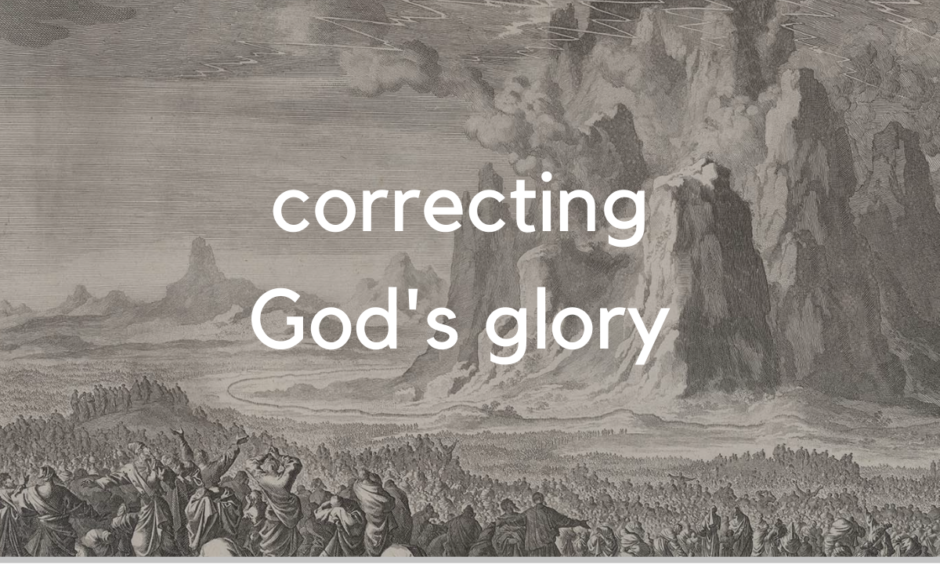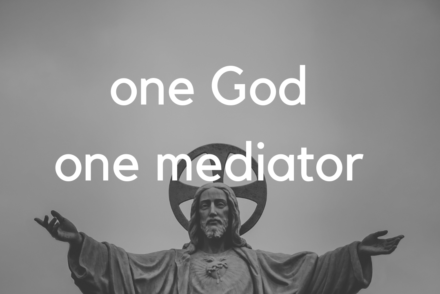If you’re like me and you’ve been around the church awhile, odds are your idea of God’s glory needs some correcting.
I grew up Christian, immersed in the church for as long as I could remember. In my mid teen years I became deeply passionate about theology and studying the Scriptures. I listened to what probably averaged out to 5 sermons a week over the period 3 years, read through the Bible multiple times most years, hosted bi-weekly theology discussion nights, lead a highschool boy’s small group, and read heavy theological works like Calvin’s Institutes, Owen’s On the Mortification of Sin, and many others. That was all before I turned 19.
Through almost all of what I was taking in – most of it from reformed circles – came the constant refrain most solidified by John Piper’s pithy statement; God is most glorified in us when we are most satisfied in Him. Or, to draw upon Piper’s source for the statement, “Man’s chief end is to glorify God, and to enjoy him forever.”
Both beautiful and, I believe, foundationally true statements. However – and this is a significant caveat – in the fifteen plus years that I’ve continued to study God’s word, lead, do ministry, and learn I’ve found that it’s absolutely crucial that before we blithely agree with the Westminster Shorter Catechism’s one-sentence summary of humanity’s reason for existence, we must ensure that we properly define what we mean by God’s glory.
What is God’s glory?
In the reformed circles I was immersed in in my late teens and early twenties, “the glory of God” was an oft-heard phrase. “I want to do whatever glorifies God.” “Will this choice display the glory of God?” In all of this the core picture of God’s glory was God’s power, holiness, and other-ness. Think Isaiah’s encounter with God in Isaiah 6 where the prophet falls to his knees out of fear, realizing his own utter sinfulness or the Israelites at mount Sinai told not to touch the mountain lest they die, and numerous other similar scenes.
By this view God’s glory is primarily something to be afraid of because it will kill you if you get too close.
That is a true image of God’s glory. God’s glory is indeed displayed in his power, holiness, and justice. However, is that primary to his glory? Is the ultimate way to glorify God to do what Isaiah did in Isaiah 6 and fall on one’s face in awe and fear?
I think not. In fact, in that Isaiah 6 passage God doesn’t seem particularly eager to have Isaiah stay in his prone position, glorifying him by his grovelling. Instead, without any request from Isaiah, an angel goes to touch Isaiah with a coal from the altar and purify him so that Isaiah can interact with God (Isaiah 6:6-8).
Jesus and God’s glory
If what Paul wrote about Jesus in Colossians 1 and elsewhere is true – that “He is the image of the invisible God, the firstborn of all creation” (Col. 1:15 NASB) – then our definition of God’s glory must be primarily shaped by Jesus. Jesus is the one who most fully reveals God’s nature and character.
If so, then might not God’s glory look more like kneeling down with a women caught in adultery and shielding her from her accusers? Could God’s glory be seen in talking with social and spiritual outcasts, healing the sick, and God literally giving his life for his people?
Whereas the traditional view of God’s glory is one that has sinners fleeing and collapsing and even being struck dead for touching what ought not be touch, the glory Jesus reveals seems to draw sinners to itself, cover over failures, and love the unlovable.
As Dane Ortlund wrote in his excellent book Gentle and Lowly,
if the actions of Jesus are reflective of who he most deeply is, we cannot avoid the conclusion that it is the very fallenness which he came to undo that is most irresistibly attractive to him. This is deeper than saying Jesus is loving or merciful or gracious. The cumulative testimony of the four Gospels is that when Jesus Christ sees the fallenness of the world all about him, his deepest impulse, his most natural instinct, is to move toward that sin and suffering, not away from it.
Ortlund, Dane C.. Gentle and Lowly (p. 30).
God’s glory doesn’t cause him to balk at the sight of sin. It’s not dependent on the harshness of his judgment of the wicked. Instead, it’s shown forth in the form of a humble servant who gives of himself for the sake of those who have rejected him.
God’s glory is his love
Here’s my proposal: God’s glory is his love for others.
This means that, contrary to what some of my less reformed friends pointed out about the reformed view of God, God is not selfish and conceited, demanding that all humanity glorify him as if he were like Haman in the old testament story of Ruth, insisting that everyone bow down when he walks by. Quite the opposite.
Jesus himself says that he is giving his glory away to his followers. Shortly before he is crucified he prayers to the Father with these mind-bending words:
The glory that you have given me I have given to them, that they may be one even as we are one, I in them and you in me, that they may become perfectly one, so that the world may know that you sent me and loved them even as you loved me.
John 17:22-23
God is not, as some reformed theologians seem to communicate, demanding that all creation give him his rightful due by glorifying him. Instead he is all about giving glory. Jesus gives his disciples his glory, that they may be one, and as a result the world sees that the Father loves those Jesus has died for and worships God in response.
In the biblical portrayal of God the weight doesn’t fall primarily on how “holy, holy, holy” God is; his glory isn’t first and foremost an inspiration of terror and fear, though it does include that. Instead, God’s glory is summed up in what God declares about himself to Moses in Exodus 34. He is,
a God merciful and gracious, slow to anger, and abounding in steadfast love and faithfulness, keeping steadfast love for thousands, forgiving iniquity and transgression and sin, but who will by no means clear the guilty, visiting the iniquity of the fathers on the children and the children’s children, to the third and the fourth generation.
Yes, God’s judgment and holiness are clearly communicated here, but note how they come after a long list: He is merciful. Gracious. Slow to anger. Abounding in steadfast love. Faithful. Loving to thousands. Forgiving iniquity, transgression, and sin. It is in those things that the glory of God is bound up and shown forth.
To rephrase Piper’s statement, “God is most glorified in us when he gives us his glory.” Or to say it another way, “God is most loved by us when he gives us his love.”
The God who is Christ is a master whose glory is shown when he tells his servants to sit down at the table so he can serve them dinner. He is a King whose glory is revealed when he kneels down to wash the feet of his betrayer. He is a God whose glory is shown in dying to restore his communion with those who rejected his Godhood.
And that, my friends, is a God and savior who is stunningly, confusingly beautiful in a world where those in power use their power to gain more power and glory for themselves. That is a God to whom the nations will look in awe and wonder.



No Comments